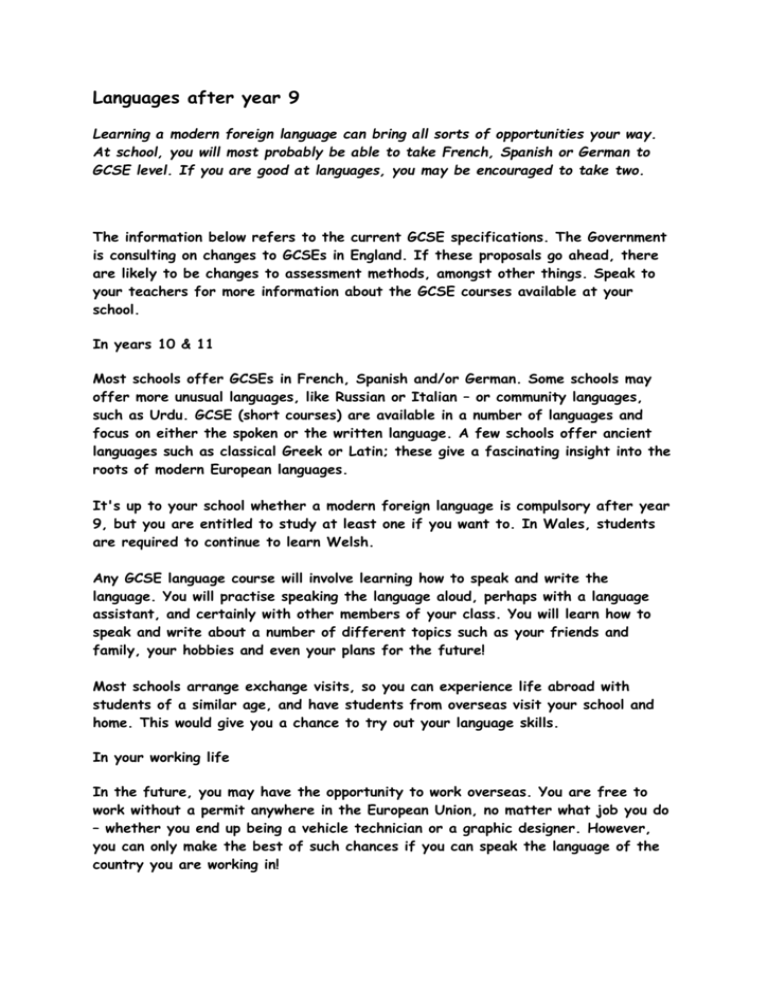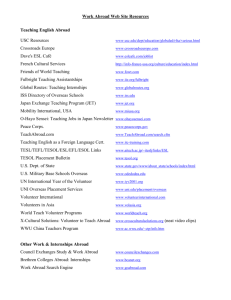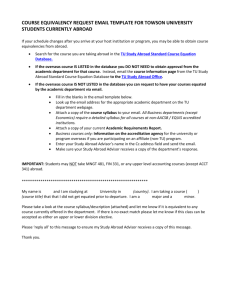Languages - Allerton Grange High School
advertisement

Languages after year 9 Learning a modern foreign language can bring all sorts of opportunities your way. At school, you will most probably be able to take French, Spanish or German to GCSE level. If you are good at languages, you may be encouraged to take two. The information below refers to the current GCSE specifications. The Government is consulting on changes to GCSEs in England. If these proposals go ahead, there are likely to be changes to assessment methods, amongst other things. Speak to your teachers for more information about the GCSE courses available at your school. In years 10 & 11 Most schools offer GCSEs in French, Spanish and/or German. Some schools may offer more unusual languages, like Russian or Italian – or community languages, such as Urdu. GCSE (short courses) are available in a number of languages and focus on either the spoken or the written language. A few schools offer ancient languages such as classical Greek or Latin; these give a fascinating insight into the roots of modern European languages. It's up to your school whether a modern foreign language is compulsory after year 9, but you are entitled to study at least one if you want to. In Wales, students are required to continue to learn Welsh. Any GCSE language course will involve learning how to speak and write the language. You will practise speaking the language aloud, perhaps with a language assistant, and certainly with other members of your class. You will learn how to speak and write about a number of different topics such as your friends and family, your hobbies and even your plans for the future! Most schools arrange exchange visits, so you can experience life abroad with students of a similar age, and have students from overseas visit your school and home. This would give you a chance to try out your language skills. In your working life In the future, you may have the opportunity to work overseas. You are free to work without a permit anywhere in the European Union, no matter what job you do – whether you end up being a vehicle technician or a graphic designer. However, you can only make the best of such chances if you can speak the language of the country you are working in! Even if you prefer to stay based in this country, many companies now do business abroad, mostly in Europe, but also in Asia, the Middle East etc. Employees – not only sales staff, but specialists like engineering or computing staff – often have to travel abroad to meet customers. Some large businesses have offices overseas offering opportunities for employment. If you can speak a foreign language, all sorts of employers will be interested in you because it will demonstrate that you are adaptable, have mental agility, and possess good oral and written communication skills. In your everyday life If you go abroad on holiday, it can be fun to speak the local language when ordering food, shopping, or simply greeting people. In emergencies, it may be vital to make yourself understood. It's also polite to show that you have made an effort to learn the language! You will be able to make friends with people from other countries – not only if you go abroad, but also when people from other countries visit your area, school or home. You could practise your language by keeping in touch with them via email, social networking sites or letter. You will often come across other languages in this country – on menus in restaurants, and on labels of various products in shops. Job ideas using languages Translating and interpreting: you must be fluent in at least one foreign language. As a translator, you deal with the written word. As an interpreter, you translate the spoken word and might, for example, interpret at international conferences. Travel and tourism: you could work as a travel rep, courier or agent for a tour operator. Teaching: if you've enjoyed learning languages, you may enjoy teaching them to others. Ask your teacher what it's like. Sales and export: sales staff – and scientific and technical people – who take products and services abroad need to be able to build good relationships with the people they hope to do business with – in their own language. Legal and financial: companies and organisations that conduct business overseas often require the services of lawyers, accountants and insurance professionals who specialise in international laws and regulations. Journalism: a reporter of foreign affairs is more likely to find out what is happening if he or she understands the language. There's not always an interpreter on hand when you need one! What other jobs can you think of where you need to be good at, or interested in, languages? Some facts and figures The institutions of the European Union are the largest employers of interpreters. There are around 50 languages that you can study at university, including Arabic, Czech and Chinese. For less familiar languages, you do not need to have studied them before going to university. However, you are likely to have to show that you are able to learn languages to a high standard by having an A level in one of the more widely taught modern languages. You can combine the study of a language with many other different subjects, like engineering and business studies. Very few jobs need languages alone, so you will need other skills. If you choose a language course at university, you usually spend a year studying or working abroad. It's thought that about 75% of internet users are non-English speakers. There are around 6,000 living languages in the world today. Research shows that business customers are four times more likely to buy a product if they are approached in their own language.











